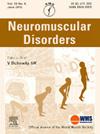35PThe impact of idiopathic inflammatory myopathy on quality of life: data from a tertiary healthcare in Indonesia
IF 2.8
4区 医学
Q2 CLINICAL NEUROLOGY
引用次数: 0
Abstract
Idiopathic inflammatory myopathy (IIM) is the most frequent acquired myopathy. The quality of life (QoL) of IIM patients can be influenced by a variety of factors and affect physical, mental, and social aspects. Therefore, the aim of our study is to identify the QoL of IIM patients and its influencing factors. This was a cross-sectional study in the period of January to May 2024 at Dr. Cipto Mangunkusumo Hospital Jakarta, Indonesia. The QoL of IIM patients was evaluated in relation to demographic factors, clinical phenotypes, subtypes, additional examinations, and the presence of caregivers. Evaluations of QoL and factors contributing to it were carried out using the following instruments: Short-Form Health Survey-36 (SF-36), Functional Assessment of Chronic Illness Therapy–Fatigue (FACIT–F), Barthel’s Activities of Daily Living (ADL) index, Generalized Anxiety Disorder–7 (GAD–7), and Patient Health Questionnaire–9 (PHQ-9). Fifty-eight patients aged 39.09±13.08 and consisted of 69% females. The mean SF-36 score was 51.07±21.67, with physical domain mean of 42.13±21.68 and mental domain median of 56.00 (2-100). Total and each domain of the SF-36 score were associated with physical limitations, ability to move, joint involvement, pain, fatigue, anxiety, depression, and caregiver availability. Polymyositis subtype exhibits the lowest QoL scores compared to other subtypes and is correlated with overall QoL and mental domain scores. The dermatomyositis subtype correlates with physical domain scores. We did not observe QoL association with disease duration, other organ involvement, certain muscle weakness manifestations, malignancy, moon face, other IIM subtype, CK level, and autoantibodies. The SF-36 score reflected low QoL of IIM patients. The QoL was significantly impacted by the aspects of illness symptoms and medication adverse effects. Comprehensive and integrative management encompassing multiple disciplines is mandatory in IIM management.
35p特发性炎性肌病对生活质量的影响:来自印度尼西亚三级医疗保健的数据
特发性炎症性肌病(IIM)是最常见的获得性肌病。IIM患者的生活质量(QoL)可受到多种因素的影响,影响生理、心理和社会方面。因此,我们研究的目的是确定IIM患者的生活质量及其影响因素。这是一项横断面研究,于2024年1月至5月在印度尼西亚雅加达的Cipto Mangunkusumo医生医院进行。IIM患者的生活质量与人口学因素、临床表型、亚型、附加检查和护理人员的存在有关。生活质量及其影响因素的评估采用以下工具:简易健康调查-36 (SF-36)、慢性疾病治疗-疲劳功能评估(FACIT-F)、Barthel日常生活活动(ADL)指数、广泛性焦虑障碍- 7 (GAD-7)和患者健康问卷-9 (PHQ-9)。58例患者年龄39.09±13.08岁,其中女性占69%。SF-36平均分为51.07±21.67分,生理领域平均分为42.13±21.68分,心理领域平均分为56.00分(2 ~ 100分)。SF-36评分的总分和每个域与身体限制、活动能力、关节受累、疼痛、疲劳、焦虑、抑郁和护理人员的可用性有关。与其他亚型相比,多发性肌炎亚型表现出最低的生活质量得分,并与总体生活质量和精神领域得分相关。皮肌炎亚型与物理域评分相关。我们没有观察到生活质量与疾病持续时间、其他器官受累、某些肌肉无力表现、恶性肿瘤、月牙脸、其他IIM亚型、CK水平和自身抗体的相关性。SF-36评分反映IIM患者生活质量较低。疾病症状和药物不良反应对生活质量有显著影响。在IIM管理中,包括多学科的综合管理是必不可少的。
本文章由计算机程序翻译,如有差异,请以英文原文为准。
求助全文
约1分钟内获得全文
求助全文
来源期刊

Neuromuscular Disorders
医学-临床神经学
CiteScore
4.60
自引率
3.60%
发文量
543
审稿时长
53 days
期刊介绍:
This international, multidisciplinary journal covers all aspects of neuromuscular disorders in childhood and adult life (including the muscular dystrophies, spinal muscular atrophies, hereditary neuropathies, congenital myopathies, myasthenias, myotonic syndromes, metabolic myopathies and inflammatory myopathies).
The Editors welcome original articles from all areas of the field:
• Clinical aspects, such as new clinical entities, case studies of interest, treatment, management and rehabilitation (including biomechanics, orthotic design and surgery).
• Basic scientific studies of relevance to the clinical syndromes, including advances in the fields of molecular biology and genetics.
• Studies of animal models relevant to the human diseases.
The journal is aimed at a wide range of clinicians, pathologists, associated paramedical professionals and clinical and basic scientists with an interest in the study of neuromuscular disorders.
 求助内容:
求助内容: 应助结果提醒方式:
应助结果提醒方式:


